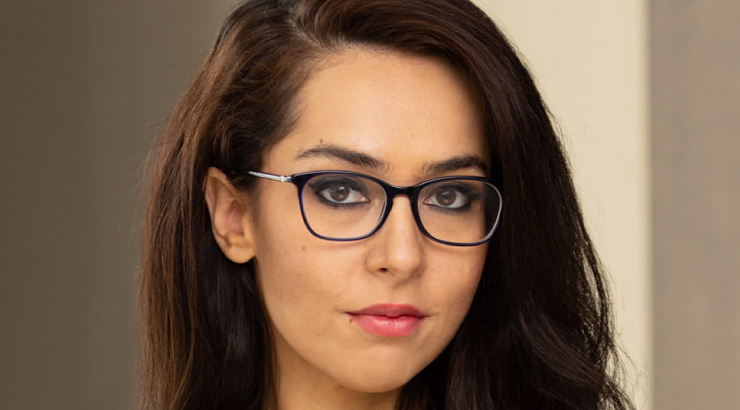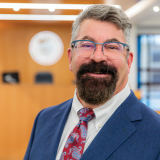
Alumni on the Move: Diversity Matters with Asal Saffari
January 24, 2023
Asal Saffari (JD ’18) is an alumnus on a mission to shape the future of Diversity, Equity and Inclusion (DEI) initiatives in Orange County’s legal profession. She is engaged with a number of DEI initiatives within the Southern California legal community, not least of all with her own firm Haynes and Boone, as well as with the Orange County Bar Association (OCBA). Saffari’s drive stems from a need to create a more inclusive environment for law students and professionals in Orange County while mentoring and nurturing the next generation of lawyers who are entering the profession.
As a first-generation Iranian-American lawyer, Saffari faced her share of challenges, initially struggling to assert herself in a professional capacity. Crushing social anxiety hindered her ability to engage directly with classmates and teachers, and routinely saw to it that she drifted through her JD without a clear focus on how to realize her interest in intellectual property law. Add to this the often intimidating nature of the profession itself, and Saffari floundered initially before finding guidance and focus through mentorship. Her difficulty in coming to grips with her studies placed her at a disadvantage, “I didn’t realize how much I didn’t understand about the legal profession,” she confesses, “about why 1L is such an important year for a student, why it’s important for students to find summer jobs to help them grow professionally.”
Luckily for Saffari, a number of mentors intervened on her behalf. As she puts it, “I think what they saw in me was a student who was able and willing to learn the ropes, and who was passionate about the law, but who was also in urgent need of guidance to shape her law career and achieve her goals.”
The guidance afforded to her through mentorship remains “the reason I now work with the Fowler School of Law CSO team,” she says. Ultimately the mentoring helped, and Saffari found her way into trademark and intellectual property law, working with marquee brands like Volcom and Western Digital, which she describes as both an amazing experience, an immense responsibility, and a necessary part of the professional education of a young lawyer. Experience is the best teacher and, following her time with Western Digital, she found her way into an established law firm and her current role at Haynes & Boone, in the Intellectual Property Practice Group in Haynes and Boone’s Orange County office.
“The baseline for [diversity and] inclusion is established now; the important thing is to keep it going.”
With this step, Saffari seemingly found her confidence in her passion for intellectual property law, along with a strong need to give back to the profession–and its tradition of mentorship–that had nurtured her early steps in the profession. She now leads a number of diversity, equity, and inclusion initiatives within the Southern California legal community. Indeed, it seems she has stumbled upon something of an unexpected passion, derived from her own difficulty in finding her feet in the law: inclusion and mentorship. Saffari has established herself as a member and co-chair of the Orange County Bar Association’s (OCBA) Diversity, Equity and Inclusion Committee and, since 2020, has organized several continuing legal education, and diversity, equity and inclusion events. As if that wasn’t enough, she has also taken on the responsibility of heading up the California Pipeline Initiatives Committee within her firm, where she organizes informative events for diverse and typically underrepresented students who are interested in pursuing law careers.
The tough experiences leading to her current role are the ones Saffari is most grateful for and these trials have helped to shape her career and her vision for DEI initiatives in Orange County.
Saffari believes that the future for DEI, at least here in Orange County, is on an upward trajectory. “DEI is a growing and important feature of the modern legal landscape. Haynes and Boone have even set aside billable hours for DEI-specific work; it’s something that makes me proud to work here,” she adds. The decision to include billable hours for DEI initiatives has been a boon for lawyers working to prioritize inclusion, where DEI has historically been slated as a nice-to-have element of practice, but very much a second-fiddle item which always followed after first sating the ever-voracious appetite of “billable hours.” As Saffari explains, large firms are starting to acknowledge and implement DEI initiatives; as she puts it, “The baseline for inclusion is established now; the important thing is to keep it going.”
Saffari’s focus for the future of her work with the DEI initiatives she is leading is to take advantage of the opportunities presented by her collaboration with the Career Services Office (CSO) at Fowler School of Law, particularly in connecting students with mentors who can help to guide and shape careers with their experience and understanding of the field. When addressing the question of what benefits alumni receive in mentoring young students, Saffari speaks to the mutual enrichment that mentoring fosters. “With mentoring, you pay it forward. It’s an unspoken duty we all have in this profession to help shape the lawyers who will be our colleagues in a few years. Mentors are vital in this process; I wouldn’t be a lawyer today without them.”
Asal Saffari volunteers at Fowler School of Law with the CSO in their diversity, equity and inclusion programming and has been invited to speak on the 2022 First Generation Panel; we hope to see her on campus again in the coming year.

